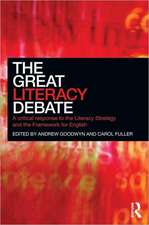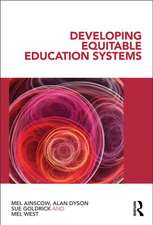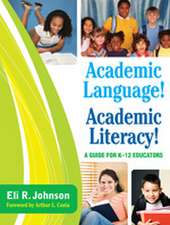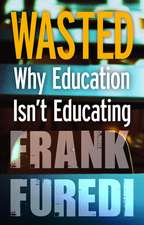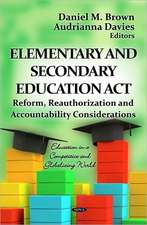Right to Be Hostile: Schools, Prisons, and the Making of Public Enemies
Autor Erica R. Meinersen Limba Engleză Paperback – 20 mar 2007
| Toate formatele și edițiile | Preț | Express |
|---|---|---|
| Paperback (1) | 413.15 lei 6-8 săpt. | |
| Taylor & Francis – 20 mar 2007 | 413.15 lei 6-8 săpt. | |
| Hardback (1) | 1276.61 lei 6-8 săpt. | |
| Taylor & Francis – 22 mar 2007 | 1276.61 lei 6-8 săpt. |
Preț: 413.15 lei
Nou
Puncte Express: 620
Preț estimativ în valută:
79.08€ • 82.24$ • 66.27£
79.08€ • 82.24$ • 66.27£
Carte tipărită la comandă
Livrare economică 13-27 martie
Preluare comenzi: 021 569.72.76
Specificații
ISBN-13: 9780415957120
ISBN-10: 0415957125
Pagini: 224
Dimensiuni: 152 x 229 x 13 mm
Greutate: 0.7 kg
Ediția:New.
Editura: Taylor & Francis
Colecția Routledge
Locul publicării:Oxford, United Kingdom
ISBN-10: 0415957125
Pagini: 224
Dimensiuni: 152 x 229 x 13 mm
Greutate: 0.7 kg
Ediția:New.
Editura: Taylor & Francis
Colecția Routledge
Locul publicării:Oxford, United Kingdom
Cuprins
1. Surveillance, Ladies Bountiful, and the Management of Outlaw Emotions 2. Strange Fruit: Prison Expansion, Deindustrialization and What Counts as an Educational Issue 3. Life After OZ: Policies, Popular Cultures, and Public Enemies 4. Awful Acts and the Trouble with Normal 5. Political Recoveries: "Softening" Selves, Hard Experiences, and Organized Resistance 6. Horizons of Abolition: Strategizing For Change through The Good, The Bad and The Innocent
Recenzii
Gwen Stowers, Associate Professor at National University
"Yes, there is a place for this book, especially with the connections to the media and public policy formation. I believe the book makes an original contribution particularly with the analysis of the Oz program [part of sample chapter]. It is important to show step by step how the public is manipulated.The material is timely and since these ideas are still not commonly know, the shelf life would be fairly long. . . . I recommend this book for publication."
Garret Albert Duncan, Associate Professor of Education, African and African-American Studies, and American Culture Studies, Washington University in St. Louis
"Right to Be Hostile is definitely a publishable project. Keep in mind that I have only had acces to the proposed book’s outline, a reference list, and Chapter 3. At the same time, I have no dpubt that the rest of the book is similarly grounded in solid scholarship and that Meiners will continue her wonderful job of rendering a hotely controversial subject and some rather dense ideas in ways to make them accessible to a broad audience, within and outside the academy."
"Given how formidable her task, the result is nothing short of remarkable. No educator can read this book and be unchanged by it." – Book Smarts, Patricia H. Hinchey, 6/16/08
"Yes, there is a place for this book, especially with the connections to the media and public policy formation. I believe the book makes an original contribution particularly with the analysis of the Oz program [part of sample chapter]. It is important to show step by step how the public is manipulated.The material is timely and since these ideas are still not commonly know, the shelf life would be fairly long. . . . I recommend this book for publication."
Garret Albert Duncan, Associate Professor of Education, African and African-American Studies, and American Culture Studies, Washington University in St. Louis
"Right to Be Hostile is definitely a publishable project. Keep in mind that I have only had acces to the proposed book’s outline, a reference list, and Chapter 3. At the same time, I have no dpubt that the rest of the book is similarly grounded in solid scholarship and that Meiners will continue her wonderful job of rendering a hotely controversial subject and some rather dense ideas in ways to make them accessible to a broad audience, within and outside the academy."
"Given how formidable her task, the result is nothing short of remarkable. No educator can read this book and be unchanged by it." – Book Smarts, Patricia H. Hinchey, 6/16/08
Descriere
In Right to be Hostile, scholar and activist Erica Meiners offers concrete examples and new insights into the "school to prison' pipeline phenomenon, showing how disciplinary regulations, pedagogy, pop culture and more not only implicitly advance, but actually normalize an expectation of incarceration for urban youth. Analyzed through a framework of an expanding incarceration nation, Meiners demonstrates how educational practices that disproportionately target youth of color become linked directly to practices of racial profiling that are endemic in state structures.


